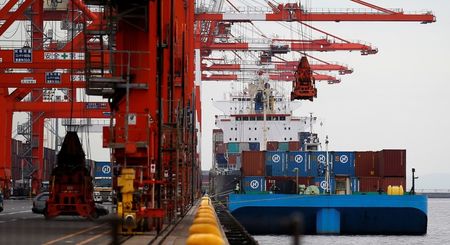By Tetsushi Kajimoto and Stanley White
TOKYO (Reuters) - Confidence at Japanese manufacturers fell the most in nearly two years in September as a tax increase hit the economy harder than expected, while exports slid in August in a further sign that conditions have deteriorated in the crucial third quarter.
This frailty in the monthly Reuters Tankan business confidence, and the shaky outlook, could raise in coming months the pressure on the BOJ to ease policy further and complicate Prime Minister Shinzo Abe's decision on whether to raise the national sales tax again.
The first phase of the tax hike in April triggered a 7.1 percent slump in the economy in the second quarter - the worst contraction since the global financial crisis.
The third quarter data will be crucial for Abe's second-stage tax-rise decision, due by year-end, but some analysts say the Reuters survey suggests that the expected recovery is not taking hold.
"Both external and domestic demand are weak, and things in the summer are clearly undershooting forecasts by the government and the BOJ, eroding business confidence," said Takeshi Minami, chief economist at Norinchukin Research Institute.
In fact, the worsening sentiment in Reuters Tankan, with only a feeble improvement forecast for December, bodes ill for the Bank of Japan's quarterly tankan survey, due Oct. 1, which had been forecast to rebound in the third quarter.
HURDLE FOR SECOND TAX HIKE 'BIT HIGH'
"Even though Prime Minister Abe says he stands 'neutral' on the tax decision, I don't think we are in a situation where the tax can be raised soon. The hurdle is getting a bit high," Norinchukin Research Institutes' Minami said.
With the recovery sputtering and inflation appearing stalled well below the BOJ's target of 2 percent, market speculation is growing that Abe may order a burst of government spending and the BOJ may oblige with further monetary stimulus to bolster the economy enough to allow the tax hike to go ahead.
The Reuters Tankan, which is strongly correlated with the central bank's closely watched poll, surveyed 486 big Japanese companies, of which 285 replied, between Aug. 29-Sept. 12.
"The effects of the decline in demand have proved larger than expected" after the April tax hike, said an executive at a machinery maker. A transport equipment producer blamed the higher tax for cooling demand and worsening business conditions.
The managers, who responded anonymously to the Reuters survey, also complained about weak external demand, notably in Asia and Europe, and uncertainty over geopolitical risks that weigh on the outlook.
The sentiment index for manufacturers fell to 10 in September from 20 in August and down from 19 in June. It is forecast to rise to 16 in December.
It was the first decline in four months and the biggest since October 2012. At that time, business sentiment was plunging amid Chinese boycotts of Japanese products and violent protests after Japan nationalized islets in the East China Sea that are also claimed by Beijing.
Service-sector sentiment edged up but was forecast to decline again.
This time, the loss of confidence comes after a slew of downbeat data, including soft factory output and falling household spending, and has cast doubt over the recovery of the world's third-biggest economy.
WEAK EXPORTS
Ministry of Finance data showed on Thursday Japan's exports declined in August as U.S.-bound shipments contracted by the most in three years, another sign the economy is struggling to rev up after the deep slump in April-June.
Exports, a weak link in Japan's economy, fell 1.3 percent in August from a year ago - less than the median estimate for a 2.6 percent annual decline. That followed a 3.9 percent annual gain in the previous month after having fallen in June and May.
The last BOJ tankan found the mood among big manufacturers had worsened in the three months to June but was expected to improve in July-September.
The survey indices subtract the percentage of companies saying conditions are improving from that of companies saying conditions are worsening. A positive number means optimists outnumber pessimists.
Abe raised the sales tax to 8 percent from 5 percent in April in a bid to curb Japan's runaway government debt, knocking the economy hard in the process.
Around December he is to decide whether to proceed with a plan to raise the tax to 10 percent next year. Abe said on Sunday he remained "neutral" on whether to raise the tax, adding that decision would hinge on the strength of economic indicators, including for the July-September quarter.

The yen has fallen to a six-year low against the dollar in recent days, but it has not yet given much of a boost to exporters, while importers, such as materials firms, are struggling to pass on rising import costs.
(Editing by William Mallard & Shri Navaratnam)
